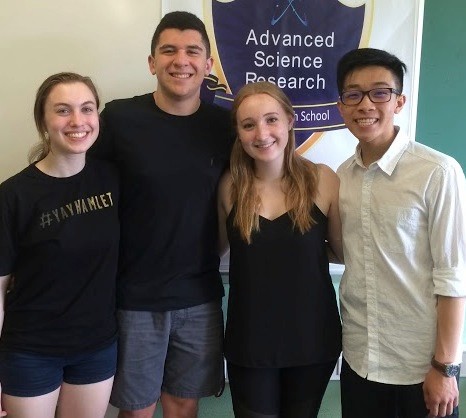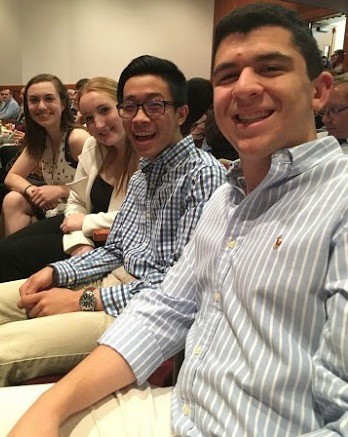Four Calhoun High School seniors honored for science research
Gene mutations, mercury emissions, tumor suppressants and text messaging were just a few of the issues researched by four Calhoun High School seniors who were honored by the Long Island Science Congress on May 16 at the Wheatley School.
Nicole Fegan, Louis Lin, Jacob Miller and Rachel November were all invited to the awards ceremony as part of the top 25 percent of competitors. More than 2,000 projects were submitted to the contest.
Miller was recognized with an honors award, while Fegan, Lin and November received high honors. The students, who had been enrolled in Advanced Science Research since they were sophomores and spent their summers in laboratories, presented their projects on April 13.
Miller spent the summer before his senior year in a Molloy College lab, researching gene mutations and casein, a protein found in milk. During the summer, Miller and his mentors discovered what they believe to be a gene mutation in autistic children that causes an intolerance to the protein.
“After taking Advanced Placement Biology, I really fell in love with molecular biology and seeing how DNA controls really every part of the human body,” said Miller. “I wanted to find a way that it was actually very relevant to see how controlling it is.”
In the fall, Miller will attend Vassar College upstate, where he plans to major in biochemistry and continue to conduct research.
Fegan conducted research for her project, “The Accumulation of Mercury by Sphagnum Moss Near a Sewage Sludge Incinerator,” in a mercury laboratory at John Jay College of Criminal Justice in collaboration with seniors at the Yale Peabody Museum in New Haven, Conn. during the summer before her senior year. Concerned about mercury emissions from a central New Haven incinerator, Fegan analyzed samples of the city’s sphagnum moss, which served as a bioindicator of mercury in the atmosphere. After analyzing the data, Fegan and her colleagues found evidence to prove that the incinerator is a source of mercury in the atmosphere.
“We gave that information to the people of New Haven, and they can hopefully use that to cause legislation to be passed that can decrease the risk of living there,” said Fegan.
Fegan will attend Brown University in Rhode Island, where she plans to continue to pursue research while studying math, chemistry or English.
Lin spent his last two summers at the zebra fish laboratory at the Mt. Sinai School of Medicine, studying a tumor suppressant.
“I worked with a tumor suppressant called p53,” Lin explained. “I was looking at how that played a role in congenital disorders of glycosylation, or CDGs for short, and that’s basically when protein synthesis gets completely messed up.”
During the project, Lin had to work around malfunctioning equipment and proposed a completely different type of cell death detection system than was originally planned. Fortunately, Lin’s new proposal worked.
“ASR and research have given me a lot in the sense of I never wanted to go into the research field,” said Lin, “but with this experience, I know that’s something I want to continue not only in college, but in the future.”
Lin plans to study neuroscience and health policy at the University of Pennsylvania in the fall.
November’s project, “Texting Within Relationships,” details the behavioral patterns that cause individuals to choose different types of communication. After two summers of research at LIU Post, November concluded that social anxiety is the best predictor of how often a person uses text messaging.
For November, the project was most worthwhile because of its potential to prevent violence within relationships.
“I think that this serves as a backbone for future research into violence within relationships and things that I think are important, especially as text messaging becomes more prevalent in society,” November said. “There are a lot of things missing from a text message. Sarcasm is misconstrued, and things like that. And because of that, these problems within relationships are more common, so finding a way to target that is probably the most important part of this research.”
November will attend American University in Washington, D.C. this fall. She plans to study economics and government, as well as conduct research in behavioral science and how it relates to politics.

 55.0°,
Overcast
55.0°,
Overcast 







